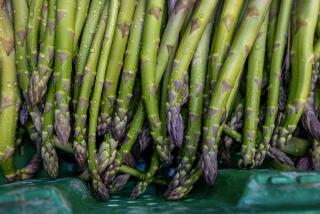So, about that asparagus ...
- Share via
A couple of hundred years ago, physicians had few diagnostic tools. To figure out what was going on inside the human body, they often turned to bodily fluids: blood, saliva, urine. They also noted unusual qualities of human urine when people ate certain foods.
In “An Essay Concerning the Nature of Ailments” published in 1731, John Arbuthnot -- physician to Queen Anne -- reported the connection between malodorous urine and asparagus intake. The vegetable had been cultivated for more than 2,000 years; the fact that its odor-producing quality surfaced so late may have been because of the increased use of sulfur-rich fertilizers during the 1700s to improve its flavor.
Several sulfur compounds impart the distinctive taste to asparagus as well as onions and garlic, which are known to be much less pungent when grown in sulfur-depleted soil.
Asparagus’ reputation for producing noxious urine is so widespread that those who produce the odor assume everyone else does too. That’s not the case. Studies indicate that about 79% of Americans are “excreters” -- they excrete smelly sulfur compounds in their urine -- as are about half the people in Britain. Non-excreters don’t suffer asparagus-eating’s effect on urine odor because they don’t produce these sulfur compounds. The ability to “excrete” is inherited.
Chemical analysis of the urine of excreters has identified six compounds responsible for the odor. Two, methanethiol and dimethyl sulfide, impart the most aroma, while the other four contribute to the unique and complex bouquet. Their source is from the breakdown of other chemicals present in the fresh vegetable.
A prime candidate is asparagusic acid, a sulfur-rich compound found only in asparagus. In 1987, a study found that excreters who ingested asparagusic acid produced the volatile compounds in their urine -- whereas non-excreters didn’t. But researchers have also suggested that other compounds present in higher concentrations in asparagus than other foods could also contribute.
A few studies published more than 20 years ago suggest that the numbers on people who produce smelly urine may be unreliable. It could be, the authors argue, that everyone produces pungent urine after eating asparagus -- but not everyone can pick up the smell.
A small study in Israel asked subjects to sniff urine samples from known excreters and found that 90% of 307 subjects were “non-perceivers.” In a similar, Chinese study, 75% were unable to detect the odor.
Probably the truth lies in the middle. There are those who produce noxious urine and those who don’t, just as some can smell asparagus metabolites and some cannot.
The asparagus story is a reminder that not everyone processes the many phytonutrients we ingest the same way. In our lab, for instance, we have found that not everyone produces the same pigment metabolites from pomegranate juice and that breakdown products appear right away in the urine of some, but days later in others.
The pigments that give beets their hue, betacyanins, are excreted by everyone, but the amounts vary considerably between different people and in the same person at different times. Stomach acid turns the red color to yellow, so most people won’t see change in urine color, but when acidity of the stomach is reduced, it’s different. In one case report, a man on antacid medication had his first (and likely alarming) instance of bright pink urine after downing a plate of beets.
The health benefits we reap from plant foods may result from the phytonutrients in them or the metabolites that are formed after we eat them. But unlike asparagus, most don’t provide us with direct evidence of the chemicals we make from them after they’ve vanished down our gullets.
--
Susan Bowerman is a registered dietitian and assistant director of the UCLA Center for Human Nutrition.





